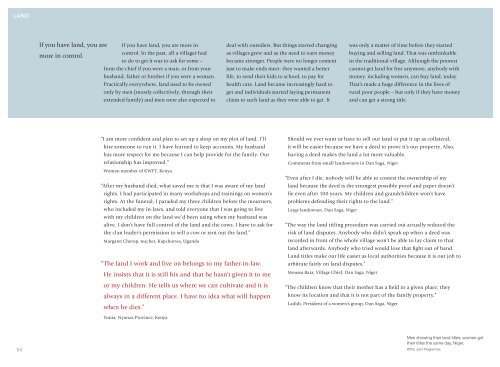Create successful ePaper yourself
Turn your PDF publications into a flip-book with our unique Google optimized e-Paper software.
LAND<br />
If you have land, you are If you have land, you are more in<br />
control. In the past, all a villager had<br />
more in control.<br />
to do to get it was to ask <strong>for</strong> some –<br />
from the chief if you were a man, or from your<br />
husband, father or brother if you were a woman.<br />
Practically everywhere, land used to be owned<br />
only by men (mostly collectively, through their<br />
extended family) and men were also expected to<br />
deal with outsiders. But things started changing<br />
as villages grew and as the need to earn money<br />
became stronger. People were no longer content<br />
just to make ends meet: they wanted a better<br />
life, to send their kids to school, to pay <strong>for</strong><br />
health care. Land became increasingly hard to<br />
get and individuals started laying permanent<br />
claim to such land as they were able to get. It<br />
was only a matter of time be<strong>for</strong>e they started<br />
buying and selling land. That was unthinkable<br />
in the traditional village. Although the poorest<br />
cannot get land <strong>for</strong> free anymore, anybody with<br />
money, including women, can buy land, today.<br />
That’s made a huge difference in the lives of<br />
rural poor people – but only if they have money<br />
and can get a strong title.<br />
“I am more confident and plan to set up a shop on my plot of land. I’ll<br />
hire someone to run it. I have learned to keep accounts. My husband<br />
has more respect <strong>for</strong> me because I can help provide <strong>for</strong> the family. Our<br />
relationship has improved.”<br />
Woman member of KWFT, Kenya<br />
“After my husband died, what saved me is that I was aware of my land<br />
rights. I had participated in many workshops and trainings on women’s<br />
rights. At the funeral, I paraded my three children be<strong>for</strong>e the mourners,<br />
who included my in-laws, and told everyone that I was going to live<br />
with my children on the land we’d been using when my husband was<br />
alive. I don’t have full control of the land and the cows. I have to ask <strong>for</strong><br />
the clan leader’s permission to sell a cow or rent out the land.”<br />
Margaret Cherop, teacher, Kapchorwa, Uganda<br />
“The land I work and live on belongs to my father-in-law.<br />
He insists that it is still his and that he hasn’t given it to me<br />
or my children. He tells us where we can cultivate and it is<br />
always in a different place. I have no idea what will happen<br />
when he dies.”<br />
Should we ever want or have to sell our land or put it up as collateral,<br />
it will be easier because we have a deed to prove it’s our property. Also,<br />
having a deed makes the land a lot more valuable.<br />
Comments from small landowners in Dan Saga, Niger<br />
“Even after I die, nobody will be able to contest the ownership of my<br />
land because the deed is the strongest possible proof and paper doesn’t<br />
lie even after 100 <strong>years</strong>. My children and grandchildren won’t have<br />
problems defending their rights to the land.”<br />
Large landowner, Dan Saga, Niger<br />
“The way the land titling procedure was carried out actually reduced the<br />
risk of land disputes. Anybody who didn’t speak up when a deed was<br />
recorded in front of the whole village won’t be able to lay claim to that<br />
land afterwards. Anybody who tried would lose that fight out of hand.<br />
Land titles make our life easier as local authorities because it is our job to<br />
arbitrate fairly on land disputes.”<br />
Moussa Bara, Village Chief, Dan Saga, Niger<br />
“The children know that their mother has a field in a given place; they<br />
know its location and that it is not part of the family property.”<br />
Ladidi, President of a women’s group, Dan Saga, Niger<br />
Yunia, Nyanza Province, Kenya<br />
54<br />
Men showing their land titles; women got<br />
their titles the same day, Niger.<br />
©The Joint Programme

















